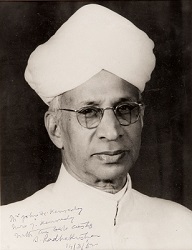Bharat Ratna Sarvepalli Radhakrishnan hailed from a Telugu-speaking Niyogi Brahmin lineage, born in Tiruttani, which is now situated in the Tiruvallur district of Tamil Nadu since 1960.
His father, Sarvepalli Veeraswami, and his mother, Sarvepalli Sita (Sitamma), were his guiding figures in his upbringing.
Renowned as one of India’s preeminent scholars in philosophy, Radhakrishnan dedicated a significant portion of his life to academia. He imparted philosophical wisdom at esteemed institutions such as the universities of Andhra, Mysore, and Calcutta.
Moreover, he held a distinguished position as a professor of Eastern religion and ethics at Oxford University. Radhakrishnan’s academic journey also saw him serve as Chancellor of Delhi University and as vice-chancellor of Benares Hindu University.
Notably, he endeavored to forge connections between Eastern and Western philosophical realms, staunchly defending Hinduism from misguided Western critiques while also assimilating Western philosophical and religious ideologies.
Radhakrishnan’s illustrious career culminated in his becoming the inaugural Vice President of India (1952-1962) followed by the esteemed role of the second President of India (1962-1967). Among the plethora of accolades bestowed upon him, notable mentions include a British knighthood in 1931 and the Bharat Ratna in 1954.
In India, his birthday is commemorated as Teacher’s Day, acknowledging his profound impact on education and intellectual discourse.
Throughout his lifetime, Radhakrishnan authored numerous seminal works, including:
- “The Philosophy of Rabindranath Tagore” (1918)
- “Indian Philosophy” (1923) Vol.1
- “The Hindu View of Life” (1926)
- “An Idealist View of Life” (1929)







